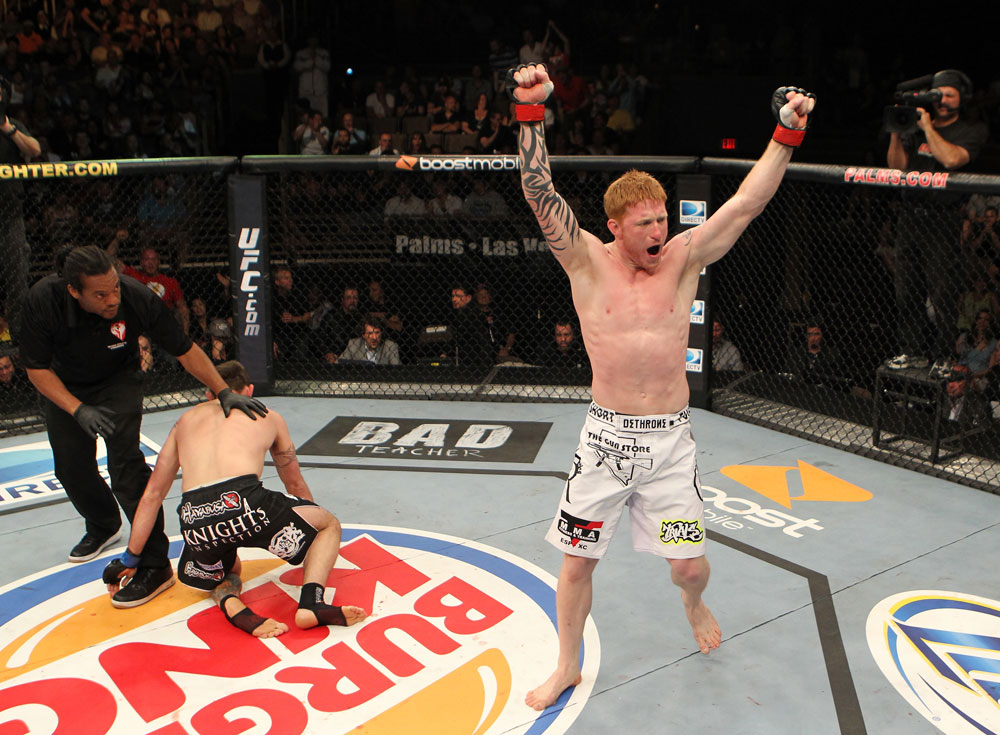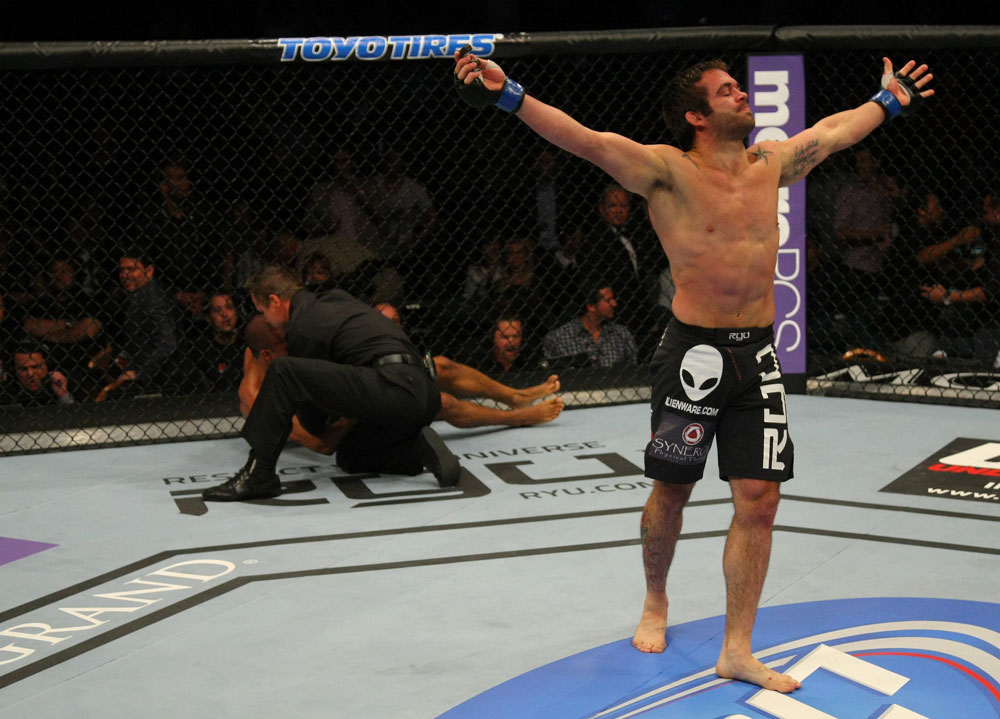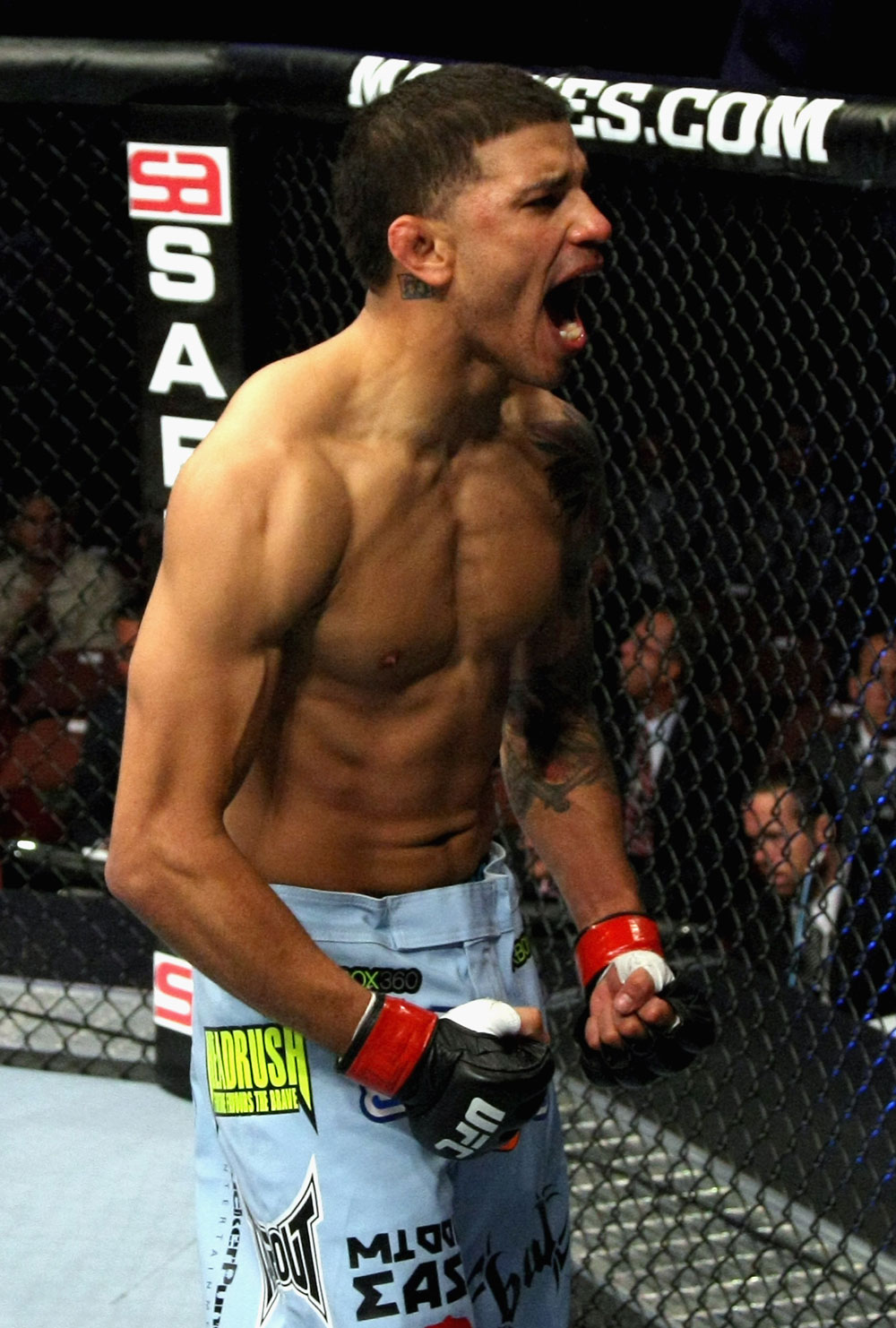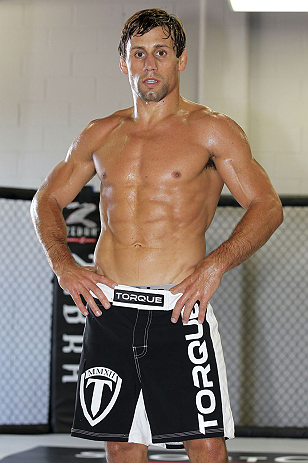 Ed Herman shouldn’t have come out for the second round of his fight with Aaron Simpson at UFC 102.
Ed Herman shouldn’t have come out for the second round of his fight with Aaron Simpson at UFC 102.
Anyone watching the fight knew that the former Ultimate Fighter finalist had injured his leg when it was caught in an awkward position as Simpson took him down late in the round. One minute later, there was Herman, ready to keep fighting, the idea of stopping never having crossed his mind.
Just a few ticks into the second frame, Herman attempted a kick and immediately collapsed in agony. The bout was stopped, and for nearly two years, so too was Herman’s career.
What could have been the end of his time as a professional fighter became the catalyst for a fresh start and a career resurgence; the forced hiatus having proven to be a positive for the 31-year-old redhead known as “Short Fuse.”
Between his loss to Simpson and his return to the cage in June 2011 against Tim Credeur, Herman uprooted from the Pacific Northwest and broke from Team Quest, the legendary outfit where he had trained for his entire career. He relocated to Fort Collins, Colorado, and eventually opened a gym, Trials MMA, the name inspired by the trials and tribulations every fighter experiences and that Herman knows all too well.
After 22 months away from the Octagon, Herman scored an impressive 48-second technical knockout victory over Credeur, following it up two months later with a first-round submission win over fellow TUF alum Kyle Noke, before running his winning streak to three with a second-round submission of Clifford Starks at UFC 143 in February.
“I’m not sure if it’s coincidence or what, but after moving out here, I’ve won three fights in a row, and things have gone real well for me,” admits Herman, who faces the toughest test of his career this weekend at UFC 150 when he takes on former Strikeforce middleweight champion Jake Shields at the Pepsi Center in Denver.
“I think sometimes you get going and you kind of feel like it’s a job or something that’s a burden; you don’t remember how great it is to have an opportunity to compete in the UFC, at this high level,” Herman offers, trying to explain the connection between his relocation and his return to contention in the deep and competitive middleweight division.
“Sometimes taking time off like that or the realization that your career is almost over because of an injury – it kind of lit a fire under my ass. (That) got me back to enjoying the sport, enjoying the training, and looking at it from that perspective like when I first started. I’m just trying to enjoy it, have a positive attitude, and things have really come together for me in that sense.”
It’s never been a question of talent with Herman.
His ability was evident prior to his appearance on season three of The Ultimate Fighter when he notched wins over the likes of Brian Ebersole, Glover Teixeira, and former UFC middleweight champion Dave Menne, and he continued to shine through his time on the UFC’s long-running reality TV competition. Despite dropping the season’s middleweight final to Kendall Grove, Herman’s gutsy performance earned him a ticket to the big leagues as well.
A few months away from celebrating his ten-year anniversary as a professional fighter, Herman knows that while he has the physical tools to be successful inside the cage, it’s the mental approach he’s taking to his craft that has helped him the most during his recent run of success.
“(I’m) just trying to enjoy myself in this sport, and not let the nerves get to me,” he says, reiterating an earlier statement. “Every fighter gets nervous before fights, and I’ve really tried to put it in perspective – enjoy what I’m doing, and realize that I’m lucky to be able to do this. That mental part has really helped me.
“A lot of guys say that it’s 80 percent mental – we’re all tough, we all have the skills, we all have the know-how. It’s putting it together at the right time and being mentally sound and prepared (that makes the difference), and I feel like that’s what I’ve been able to do more than anything.”
This weekend will be Herman’s second opportunity to fight at home on the UFC stage, the first coming that fateful night against Simpson at UFC 102. While his previous experience went as poorly as possible, Herman is happy to get the chance to fight close to home again, and believes all the time he spends training in the thin air and elevation will definitely play a part in how things play out on Saturday night.
“I think it’s great that I don’t have to travel,” said Herman. “Vegas isn’t too bad – it’s easy travel – but sometimes you go a lot farther away, and that can affect you a little bit. I’m stoked to fight here in Denver. It’s going to be great for exposure for my gym, and I think the altitude is going to be a huge factor.
“I was just in Vegas a couple weeks ago for the Fight Summit, and I did some training, and I just felt amazing. I’ve never felt in such good shape. I don’t know if I’m just in that good shape or if the altitude is helping me as well.
“I was never a huge believer in the altitude stuff when it came to training, but I think the difference is when you sleep here and you live here in the altitude, rather than guys who just go and train there for a couple of weeks or whatnot. I think being here full-time and living here is what makes the difference.”
Rattling off three wins since returning last summer has earned Herman the opportunity to welcome Shields to the middleweight division, though it’s not unfamiliar territory for the former welterweight title challenger.
Shields won the Strikeforce middleweight title in a bout against Jason “Mayhem” Miller and defended the belt against current light heavyweight title challenger Dan Henderson prior to exiting the organization. When he signed with the UFC, Shields returned to the 170-pound ranks, where wins over Martin Kampmann and Yoshihiro Akiyama bookended losses to Georges St-Pierre and Jake Ellenberger.
Despite the fact that Shields is coming off a victory at UFC 144 in February, Herman says he wasn’t surprised to hear that the Californian was returning to compete in the 185-pound weight class, and welcomes the opportunity to share the cage with a well-known, highly respected former champion.
“If you look at his past, he’s actually done a lot better at middleweight, rather than at 170. I don’t know if the cutting weight affects him more, but he’s always seemed to do better at 185. I’m prepared for a battle, and I’m super-stoked to get an opportunity to compete against one of the best guys around. I’ve been asking for a bigger name – someone that I can go in there and get a big win against. I think Jake’s a perfect matchup for me; he’s a very talented, very intelligent fighter, but I think it’s a great matchup for me stylistically.
“It’s no secret that Jake’s highest percentage of victories are when he’s taking guys down and controlling the ground game, looking for his submissions,” continues Herman, offering his assessment of Shields and a glimpse into how he’ll approach the fight when the cage door closes on Saturday night.
“I’m not afraid to go on the ground with him, but I don’t really want to be underneath Jake; he’s really good at passing the guard, and controlling dominant positions. I’m going to try and defend the takedown, and put my hands on him. I’ve seen him get dropped a few times, so I feel like I need to be patient and smart, and try to hurt him with my hands. I just need to be really smart, pick my shots, and be an intelligent fighter this time.”
After nearly 10 years as a professional fighter, and three years removed from the horrific injury that made him take stock of his career, Herman feels like he finally has all the pieces in place to make a serious push towards the top of the middleweight division.
“This sport takes a while to mature into, and I really feel that I’ve done that. That two-year layoff kind of gave me a realization of what I have and how soon it can be over, and (made me recognize that) I’ve really got one more good run in this thing.”
Don’t be surprised if Herman takes another step forward on Saturday night.




